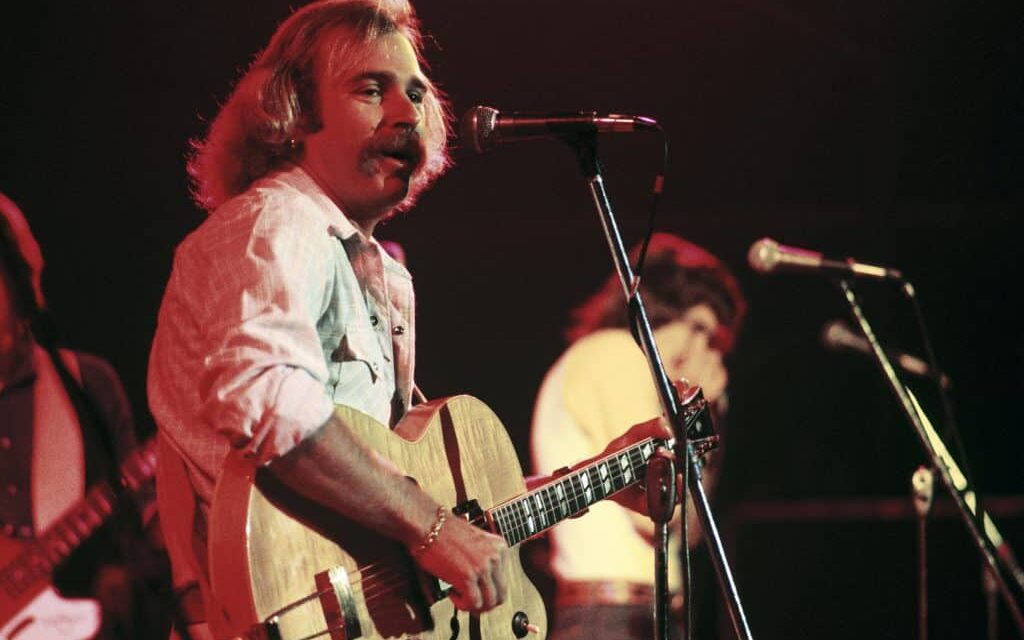SAILING AWAY: Jimmy Buffett performs with The Coral Reefer Band at The Omni Coliseum on September 4, 1976 in Atlanta. (Photo Tom Hill/Getty Images)
I was on to Jimmy Buffett pretty early on. Certainly, well before the Buffett “brand,” the stadiums, even the Parrothead culture that was among the first to “parrot” what the Grateful Dead had organically built with its Deadhead lifestyle.
Buffett came to my attention via an avenue largely unavailable to singer/songwriter types today, FM rock radio. All of us growing up in Middle Tennessee in the ‘70s got turned onto Buffett in the same way we learned about John Prine, Guy Clark, Harry Chapin, Willie Nelson, Waylon Jennings, and many more, through the waves of 103.3 WKDA FM (which became KDF in 1976). Same place we found Skynyrd, the Allmans and Southern Rock in general, the Stones, Black Sabbath, The Who, etc., as we abruptly transitioned in our teens from AM pop to the good stuff. That’s more than true as well for all the hard-touring arena-rock acts of the day, including Journey, Styx, Kansas, REO, Nugent, on and on.
Jimmy Buffett: The Pollstar Interview (Video)
But back to Buffett, whose death on Sept. 2 hit the heart particularly hard. It’s hard to believe he was very much a niche artist in the mid-‘70s. Of course, everybody heard the radio staple “Come Monday” (recorded as a country single), which stood out with its Hush Puppy (remember those?) reference and memorable “Labor Day weekend show,” (as I knock this out on Labor Day). I jumped on around Havana Daydreamin’ time, an album before Buffett had an improbable hit (and eventual billion-dollar empire) in “Margaritaville” in ’77. An early show in Nashville (where Buffett was once based) at Exit/In became legendary, and I first caught him live where I was baptized by so many other legends, at the city’s Municipal Auditorium on the artist’s Son of a Son of a Sailor tour (which yielded the excellent live album You Had to Be There). By then, Buffett was all in on his stoned pirate persona and “Gulf & Western” musical niche, and we were all in on Buffett.
The rest is history. Like so many other acts of his era, Buffett built his career on stellar live performances, and a helluva lot of them. Buffett is a pretty damn good songwriter with unimpeachable interpretative skills, but the ‘70s was a fertile time for those type artists. Buffett became a billionaire because he recognized something strange was happening amongst his fans before, during, and long after the shows (you didn’t see many coconut bras on dudes at Nugent concerts), and then capitalizing on it by building a lifestyle brand around the attitude his artistry encompassed. Common now, genius then.
But it all boils down to the live shows, as Buffett well knew. “That’s what did it,” he told me in our last interview, during the COVID shutdown. “I still feel [playing live] is our strong suit…we earned our reputation as being professional and giving you a bang for the buck at shows, by being good entertainers.” That means giving it hell every time, whether busking on a New Orleans street corner, in a half-filled club, or in a sold-out stadium. “If you’re a real performer, it doesn’t matter. I’ll give as much quality as I can to two people as I can give to 20,000 people, that’s just the way I feel.”
Ultimately, the Buffett brand, beginning with authentic songs performed with vigor on stage and blossoming into an empire, is about escapism. For a land-locked Tennessee kid stuck in a small town, the idea of sailing the wide-open seas, high as a kite, to destinations unknown, was beyond appealing, and I was clearly not alone. “We deal in escapism,” Buffett said, “because I think it’s necessary in the world we live in and more so now than ever. People need that in their lives, and we did it.”
Fans can sense when an artist cares about them and Buffett clearly did. He delivered, big time. We wish you fair winds and following seas, Mr. Buffett, as you “light out for the territory.”
Jimmy Buffett all-time tour numbers (1981 – 2023):
Overall gross: $630,212,173
Tickets sold: 13,766,026
Reported shows: 893
Top five best-attended events:
-
Gillette Stadium; Foxborough, Massachusetts; Sept. 2-8, 2007. Tickets: 106,724 Gross: $10,200,319; Shows: 2
2. Riverbend Music Center; Cincinnati, Ohio; Aug. 6-11, 1993. Tickets: 90,027. Gross: $2,044,192; Shows: 5
3. Citizens Bank Park; Philadelphia; Aug. 25-27, 2005; Tickets: 85,451 Gross: $6,826,906; Shows: 2
4. Great Woods Center for the Performing Arts (now XFINITY Center); Mansfield, Massachusetts; Aug. 25-31, 1996; Tickets: 79,840; Gross: $2,501,397; Shows: 4
5. Wrigley Field, Chicago; Sept. 4-5, 2005. Tickets: 79,755; Gross: $7,897,550; Shows: 2
Source: Pollstar







